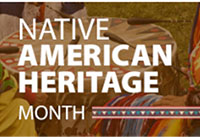 On October 31, 2018, President Donald Trump proclaimed November as National Native American Heritage Month. During November, communities and organizations across the nation honor the culture and contributions of American Indian and Alaska Native (AI/AN) people, and the Department of Justice renews its commitment to ensuring public safety in Indian country.
On October 31, 2018, President Donald Trump proclaimed November as National Native American Heritage Month. During November, communities and organizations across the nation honor the culture and contributions of American Indian and Alaska Native (AI/AN) people, and the Department of Justice renews its commitment to ensuring public safety in Indian country.
The Office of Justice Programs (OJP) observed Native American Heritage Month with a November 20 program titled “Violent Crime in Indian Country: Bureau of Indian Affairs (BIA) Law Enforcement and Victim Services.” In her keynote speech, Savannah Joe, a victim specialist for BIA’s Office of Justice Services and an enrolled member of the Diné Nation, described how law enforcement, prosecutorial offices, and crime victim specialists collectively work together to promote safety. OJJDP Administrator Caren Harp joined the directors of the Office for Victims of Crime and the Bureau of Justice Assistance in providing an overview of their offices’ work in tribal communities, including open solicitations, grants awarded, and how those grants will benefit Indian country.
For decades, OJJDP has honored its commitment through programs and training and technical assistance that prevent crime and promote positive life outcomes among tribal youth. Following are highlights of OJJDP’s current work:
- The Tribal Youth Program supports tribal governments in preventing juvenile delinquency and responding effectively to youth in the juvenile justice system. The program includes prevention services (e.g., youth gun violence reduction programs, school dropout prevention programs, afterschool programs); interventions for court-involved tribal youth (e.g., graduated sanctions, restitution, diversion); improvements to the tribal juvenile justice system (e.g., indigenous justice strategies, tribal youth courts, advocacy programs); and substance abuse prevention and mental health services.
- Tribal Juvenile Healing to Wellness Courts enhance the capacity of tribal courts to respond to substance abuse-related issues of youth younger than 21. The courts bring together community healing resources with the tribal justice process, using a team approach to achieve the physical and spiritual healing of the participant and the well-being of the community.
- The OJJDP Tribal Youth Training and Technical Assistance Center provides comprehensive training and technical assistance for OJJDP tribal grantees. The center works with grantees through a strategic planning process and offers ongoing support throughout the course of their grant program. All tribes, regardless of whether they are funded by OJJDP, are eligible to participate in an array of trainings, webinars, and online virtual simulation trainings.
- The National Intertribal Youth Leadership Development Initiative aims to enhance tribal efforts to increase youth engagement, coordination, and action related to juvenile justice, delinquency prevention, and public safety in Indian country. The initiative supports regional learning events for tribal youth focused on developing leadership skills.
- Mentoring programs through the Mentoring Opportunities for Youth Initiative promote positive behaviors
and reduce risk factors associated with delinquency and juvenile justice system involvement, such as poor school attendance, school failure, and alcohol and drug abuse. OJJDP created a category in the fiscal year 2018 Mentoring Opportunities for Youth solicitation specifically identifying tribes as eligible for $1.25 million each to support mentoring services for youth impacted by opioids.
Resources:
On September 26, 2018, Administrator Caren Harp participated in a hearing of the Senate Indian Affairs Committee on the Government Accountability Office report Native American Youth: Involvement in Justice Systems and Information on Grants to Help Address Juvenile Delinquency. Read Administrator Harp’s testimony.
To learn more about OJJDP’s tribal initiatives, visit the Office’s website.
